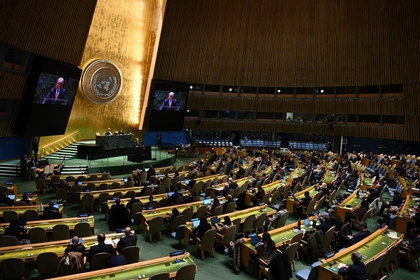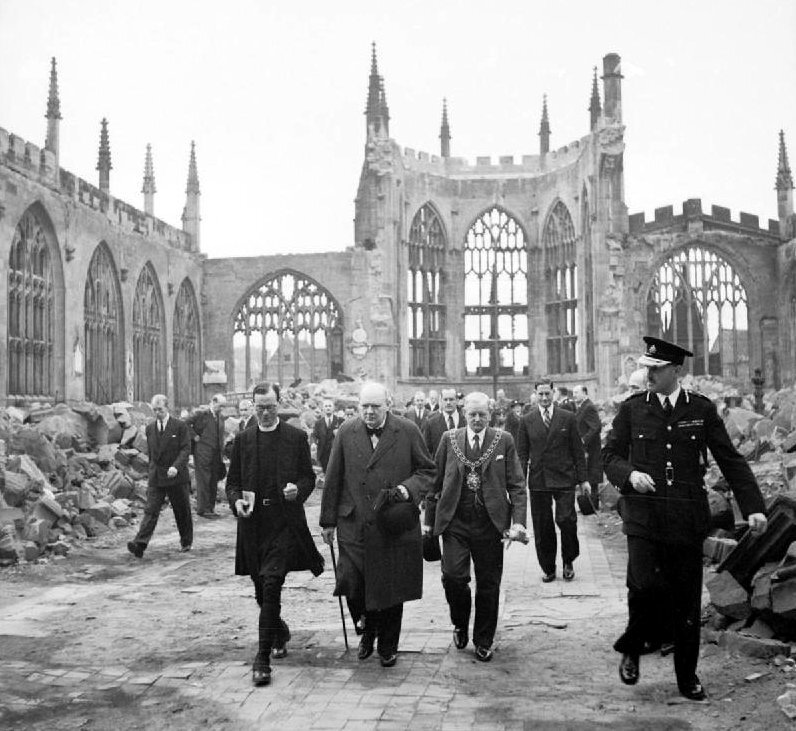Western Europe has gone down this appeasement road to nowhere before. In 1938 and again now – perhaps inconceivably – British Prime Minister Rishi Sunak, French President Emmanuel Macron, and German Chancellor Olaf Scholz are reportedly angling for NATO to give this dead-end route yet another go. It did not work for Neville Chamberlain then, nor will this path lead to “peace for our time.”
- View the most up-to-date Ukraine news articles published today.
- Read the newest Ukraine news stories published today.
JOIN US ON TELEGRAM
Follow our coverage of the war on the @Kyivpost_official.
In retrospect and in light of Britain, France, and Germany’s behind the scenes machinations, unless he is part of it, is it possible that U.S. President Joe Biden’s rousing speech in Warsaw was geared as much toward these three NATO countries as it was to Russian President Vladimir Putin?
If so, then that would mean Biden’s declaration that the “appetites of the autocrat cannot be appeased, they must be opposed,” had a very different second meaning. In that double entendre mode then, Biden’s message to London, Paris, and Berlin was that the appetites of the appeasers cannot be served. They must be forcefully opposed.
Lessons from history
Recent European history is proof enough of why the West must never travel down this road again. Appeasers chasing peace only find the very war in the end they were trying to avoid. That was exactly the case when Chamberlain and French Prime Minister Édouard Daladier foolishly agreed to carve up eastern Europe by signing the Munich Agreement with German Chancellor Adolf Hitler and Italian Duce Benito Mussolini in the name of “peace.”

US Urges Backing of ‘Simple’ UN Resolution as Trump Calls for Putin-Zelensky Talks
In 1938, it was Czechoslovakia and the Sudetenland being served up on the menu. Now, if Old NATO – Britain, France, and Germany – prevail, it would be Ukraine’s Crimea, Luhansk, and Donetsk oblasts permanently lost to Russian tyranny. If that scenario plays out, there would only be two winners. Putin and “multi-polar” collaborator, Chinese President Xi Jinping. Taipei’s fate, in that vein, is closely tied to that of Kyiv’s own.
Sunak, Macron, and Scholz’s reasoning, purportedly, is because they collectively do not believe Ukraine can decisively win on the battlefield, let alone militarily push Russian forces out of long held and entrenched positions in Crimea. If so, then this mentality, at its core, is defeatist in nature. It also lacks the intrepid leadership former British Prime Minister Winston Churchill brought to the Allied war effort throughout World War II in overcoming the near death-blow Chamberlain and Daladier’s appeasement dealt the United Kingdom and France.
Old NATO’s penchant for self-inflicted despair – what happened to Churchill’s adage to “never despair?” – runs diametrically opposite to retired-U.S. Army Lieutenant-General Ben Hodges’ military assessment. Hodges is adamant Ukraine can and “will win because it has the superior will” to fight. So too is Ukrainian President Volodymyr Zelensky who has consistently militarily proven his critics and Putin wrong since day one when he refused a free ride out of town.

Churchill walks through the ruins of Coventry Cathedral with J A Moseley, M H Haigh, A R Grindlay and others, 1941. Wikipedia
Zelensky is Ukraine’s Churchill and indeed, arguably, he is NATO’s much-needed modern manifestation of Britain’s greatest wartime leader. Sunak, Macron, and Scholz, inexplicably, have lost sight that NATO only exists because of Churchill’s unwavering resolve to fight tyranny head on despite the odds against him. His deep and determined resolve to win, “whatever the cost might be,” is incredulously missing in Old NATO.
Principles of victory
It would be one thing if victory in Ukraine were impossible. But it is not. Crimea, as Hodges avows, can and should be the “decisive terrain” of this war that brings about Ukrainian victory and Russian defeat. Moreover, that victory, as Hodges argues, must be defined by three overarching principles if the post-WWII order is to be restored.
1. “All Ukrainian sovereign territory restored to Ukraine, including Crimea and Donbas”;
2. “All deported Ukrainians returned home to Ukraine”; and
3. “Accountability for Russian war crimes.”
Hodges’ framework, after all, is what the United Nations envisioned the world to look like after WWII if confronted with belligerent regimes bent on territorial conquest. The vast majority of the current U.N. General Assembly affirmed just that recently when they voted 141-7 alongside 32 abstentions for Russia to “end hostilities in Ukraine and withdraw its forces.” In effect, the General Assembly is insisting Moscow fulfill its sacrosanct obligations as a permanent member of the U.N. Security Council and guarantor of global order.
If the U.N. as a global governing body can see that value, why not Old NATO?
Ukraine’s safety and territorial independence, like every member-state of the U.N., depends upon all members upholding its founding principles and charter. If the U.N. cannot guarantee Ukraine’s survival, then it is unlikely a NATO side agreement between Brussels and Kyiv purportedly being pushed by Sunak, Macron, and Scholz would either. Article 5 is what gives NATO its teeth. Anything less is simply unenforceable window-dressing.
Warsaw, tragically, knows this deceptive ploy all too well. Like Czechoslovakia before it, Poland on Sept. 1, 1939 was invaded by the Nazis under the pretense of a false-flag operation. Sixteen days later, Soviet leader Joseph Stalin ordered his military forces to overrun the eastern half of the country in accordance with the secret provisions of the Molotov-Ribbentrop Pact.
While Britain and France did immediately declare war on Germany as they had pledged, Poland and Czechoslovakia eventually found themselves on the outside looking in after being abandoned by London and Paris behind the Iron Curtain at the start of the Cold War. Even worse, Churchill in a highly misguided attempt to preserve the British Empire in the “Far East and Mediterranean,” spearheaded selling Poland out to the Soviets in a secret deal with Stalin in late 1944.
Zelensky cannot afford to go down that same dead-end road. Neither can Poland. If Zelensky is forced onto it by Old NATO, he risks Ukraine committing national suicide. If Polish President Andrzej Duda, in turn, acquiesces to Old NATO, he exposes Warsaw to being next in the crosshairs of the Kremlin, Article 5 notwithstanding. If NATO can be heeled now, Putin will be emboldened to try again.
As it is, Sunak and Macron’s ever-shifting definitions of “winning” are encouraging Putin to stand pat and fight on in Ukraine. One day Sunak speaks of Ukraine outright winning the war. The next, only of Kyiv defending itself and only narrowly obtaining a “decisive advantage” on the battlefield. Ditto Macron. When Zelensky was in Élysée Palace Paris last August, Macron declared that Ukraine “can count on France to help win this war.” Then, last week, Macron bluntly asserted that the war in Ukraine would not “conclude militarily.”
What does winning really mean to these two leaders and what will winning look like if their version of it comes to fruition?
Unfortunately, we likely already know. Seemingly, it is increasingly clear that Sunak and Macron equate winning with forcing Zelensky to the negotiating table and that, consciously or not, like Chamberlain and Daladier before them vis-à-vis the Sudetenland, they view Ukrainian territorial concessions as a means to their ends. If that is indeed the case, then it also means “winning” in Hodges’ sense of the word – and our own – in terms of victory on the battlefield would be off the table as far as Old NATO is concerned.
NATO’s fear of an outright Ukrainian victory
Old NATO, therefore, while conceding the need for Ukraine to obtain a decisive advantage on the battlefield, does not want to empower Kyiv to achieve an outright victory. Why? Partly the ongoing economic cost of the war – and fears of what a post-Putin Russia might look like now and into the foreseeable future.
Exchanging Ukrainian territory for peace, however, likely conflicts with where the Biden administration needs to be at right now. Negotiations, if not war, are looming in the Pacific as Beijing and Washington face off on the future of Taiwan. If Washington concedes Ukrainian territory to Putin, Xi will demand the same of Taipei.
Plus, like Old NATO, the U.S. is likely deeply troubled by what a post-Putin Kremlin would mean for the West. In that sense, while Washington wants Ukraine to prevail and to retain all of its territorial integrity, Biden does not want Ukraine to fully win in the sense that Putin loses. Especially if losing means Russia devolving into civil war or outright disintegration of the Russian Federation itself – and all that would entail in terms of who would control Russia’s vast nuclear arsenal.
If London, Paris, and France succeed in their plan to entice Zelensky into negotiations under their appeasement-like provisos, this just war against Putin and Putinism will not end well. Europe would only be setting itself up for more Russian aggression. To that end, Ukraine must reject Sunak, Macron, and Scholz’s overtures as a non-starter.
Poland, likewise, must urgently take the lead in marshalling New NATO – the former Soviet member-states including Estonia, Latvia, Lithuania, and Romania – in taking a hardline against this Old NATO driven initiative. If not, Eastern and Central Europe will likely end up more militarily exposed than ever to Moscow. So too would the neighboring countries outside of NATO’s Article 5 shield, including Moldova and Georgia.
History rarely repeats, but it does frequently echo itself. First, the Munich Agreement is chiming in as a deadly reminder that appeasement seldom works. Second, the Budapest Memorandum entered into by Ukraine is proof enough that Kyiv cannot rely on Western security assurances let alone non-binding military pacts such as the one Old NATO is purportedly drafting. The 1994 nuclear disarmament agreement did not stop Russia from seizing Crimea in 2014, nor did it stop Putin from launching his ‘special military operation’ in 2022.
For now, however, we appear to be on that same appeasement road to nowhere in Ukraine. Old NATO is chasing an ephemeral peace that cannot last and the Biden administration and Putin, paradoxically, are each trying to stare each other down by threatening the other side with a “forever war.”
Enough already. Ukrainians have paid a high enough bloody price for the West’s dithering. It is well past time for strategic clarity and Ukraine has earned the right for that clarity to be that of unconditional victory – and full NATO membership.
Jonathan Sweet, a retired Army colonel, served 30 years as a military intelligence officer. His background includes tours of duty with the 101st Airborne Division and the Intelligence and Security Command. He led the U.S. European Command Intelligence Engagement Division from 2012-14, working with NATO partners in the Black Sea and Baltics. Follow him on Twitter @JESweet2022.
Mark Toth is a retired economist and entrepreneur who has worked in banking, insurance, publishing, and global commerce. He is a former board member of the World Trade Center, St. Louis, and has lived in U.S. diplomatic and military communities around the world, including London, Tel Aviv, Augsburg, and Nagoya. Follow him on Twitter @MCTothSTL.
The views expressed are the authors’ own and not necessarily of Kyiv Post.
You can also highlight the text and press Ctrl + Enter











